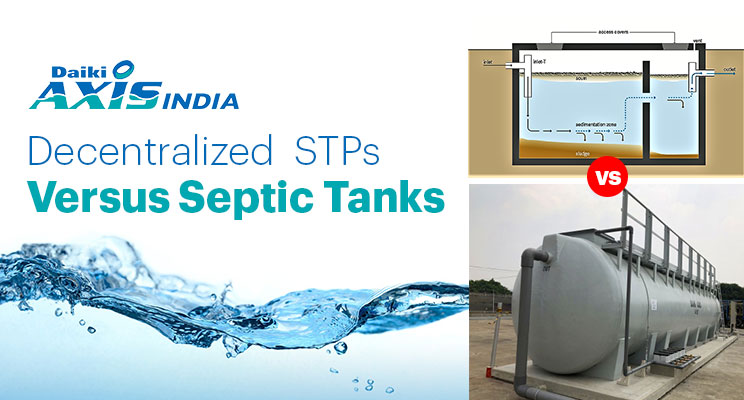It’s easy to choose between a Septic Tank and a decentralized Sewage Treatment Plant. Times have changed; technology has eased the usages and benefits. A sewage treatment plant provides treatment of the waste, whereas a septic tank simply separates it – this means that the waste water that leaves a sewage treatment plant is cleaner than what leaves a septic tank.
Decentralized STPs have a lower life cycle cost. It requires only bi-annual cleaning. Decentralized STPs are suitable for individual houses, farmhouses, small communities, hospitals, hotels, schools, airports, bus stations, offices, parks and many more. It is also suitable for congested places.
Septic tank is not suitable for highly congested areas. Due to the lack of proper maintenance, the septic tank may produce a foul odour. It may also aid the breeding of mosquitoes and flies.
Septic tanks are more sensitive to solid waste and can be damaged relatively easily. Decentralized STPs can deal with a wide range of wastewater variations across the world without damage.
Decentralized STP needs only Bi-annual cleaning. This gives you peace of mind 365 days. Whereas septic tanks require frequent maintenance than decentralized STP.
Treated wastewater from decentralized STP is so clean, thus enabled to be used for various non-potable activities such as gardening, horticulture, construction etc.
Decentralized STPs are smarter wastewater treatment systems that not only help recycle water but are also a cost-effective solution to rejuvenate the country’s parks and green belts.
Daiki Axis decentralized STP Johkasou is empanelled by the Ministry of Jal Shakti (Government of India), it has won the first prize in ‘innovation in water technology by FICCI, and it is certified as GreenPro by CII. In some cases, due to the lack of efficiency of the tank, it may lead to contamination.
It is hassle-free and assures consistent quality. So, it’s time to choose Daiki decentralized STP over a septic tank.

